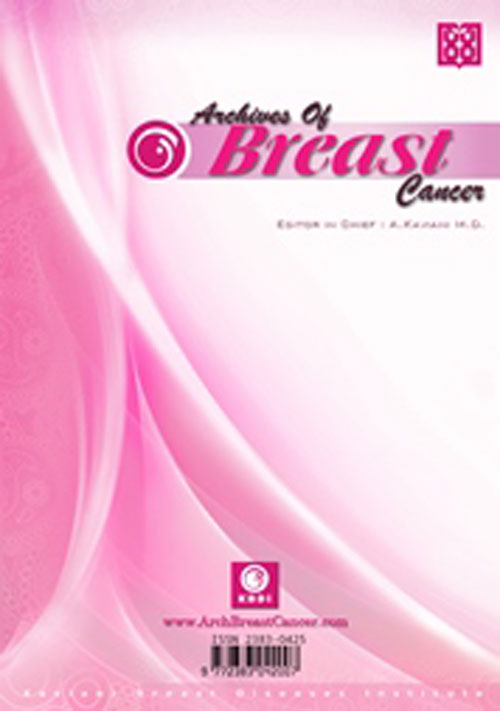فهرست مطالب

Archives of Breast Cancer
Volume:4 Issue: 3, Aug 2017
- تاریخ انتشار: 1396/08/13
- تعداد عناوین: 7
-
-
Pages 81-83
-
Pages 87-93BackgroundThe present study aims at determining the proportion of clinical information known by the patients with cancer and their families about diagnosis of their disease as well as investigating the different attitudes of patients and their families towards informing the patients of the malignant nature of the disease.MethodsWe designed a structured questionnaire which was completed by patients with cancer who were under follow up in Cancer Institute of Tehran University of Medical Sciences, and one member of their families who accompanied them while being treated. Patients, physicians, and patients family members were interviewed separately.ResultsA total of 250 cancer outpatients and 250 patients family members were interviewed. Overall, 227 patients (90.8%) desired to be informed of their diagnosis, and 98 patients (38.8%) declared that physicians informed them completely. One hundred fifty-three family members (61.2%) believed that patients are entitled to know the truth. Stepwise multiple logistic regression analysis indicated that patients educational grade (odds ratio: 6.08; 95% CI, 1.27 to 29.07) and patients age (odds ratio: 7.97; 95% CI, 1.25 to 50.59) were predictable factors for requesting to know the truth.ConclusionsFindings of the present research indicated that most patients and family members wanted to be informed of the diagnosis; The present study suggests that physicians respect the patient's rights to know the truth and inform them accordingly. This can help them adapt themselves to new condition and manage their own life.Keywords: Disclosure, patients with cancer, truth telling, families, attitude
-
Pages 94-98BackgroundEvidence on physician's attitude toward conflict of interest is scant on a global scale and almost non-existent in a regional/national scale. This investigation is a pioneer to evaluate this issue in the Middle East and Iran.MethodsWe invited physicians of different (sub)specialties/educational levels who were engaged in breast cancer management to take an online 13-question survey regarding their attitude toward different statements on conflict of interest. The responses were then collected and analyzed.ResultsThe questionnaire was returned by 91 out of 157 recipients (response rate = 57.9%). Based on the answers, advertisement by pharmaceutical sales representatives in academia was considered inappropriate (63.8%) and influential on clinical practice (80.2%). It was the belief of 59.4% of participants that local practice norms defined whether or not to accept travel grants. According to these norms, they might have accepted paid travels (53.9%), but not financial offers (72.2%). It was acceptable to deliver (74.8%) or attend (68.9%) a speech when a financial/scientific relationship with industrial companies existed and 93.4% believed that the disclosure and transparency rules should be respected in such situations. Physician-industry financial contracts were generally unfavorable (60.5%), especially when it came to prescribing a drug among other equally effective choices (71.1%). The majority of respondents (92.3%) stated that they would choose the best approach for the patients regardless of possible prejudgments on conflict of interest.ConclusionThe observed variation in physician's standpoints highlights the necessity for more comprehensive training and implementation of rigorous protocols regarding conflict of interest.Keywords: Conflict of Interest, Ethics, Attitude, Surveys, Questionnaires, Breast Neoplasms
-
Pages 99-103BackgroundOne of the essential issues in doctor-patient relationship is the matter of telling the truth of cancer diagnosis to patients. This is not only important from an ethical standpoint, but also can have legal implications. Thus, truth-telling and its associated factors are of great importance especially in cancer patients. The aim of this study was to evaluate factors effective in doctors telling the truth to their patients.MethodsThe statistical population included specialists and subspecialists working in the field of cancer treatment in Tehran. Overall, 161 questionnaires, designed for our study, were gathered and evaluated.ResultsAccording to our study, 87.6% of the responders would tell the truth to their patients, while 12.4% wouldnt do so. They believed that the best person to tell the truth to the patient is the physician or the psychiatrist specialized in this field. Ninety-two percent of physicians felt the need for developing a guideline on educating patients. There was a significant difference between oncologists and non-oncologists in terms of tendency to tell the truth, with non-oncologists showing more tendency. Most of the doctors preferred to tell the truth to their middle-aged (5170 years) patients rather than to their younger or older patients.ConclusionOnly 25.5% of physicians in our study had the policy to tell the truth to the majority of their patients, and almost all of them felt the need for having a formal guideline regarding informing and educating cancer patients. This highlights the significance of cultural-religious context of our country and the importance of having a practical guideline to educate our physicians.Keywords: Disclosure, patients with cancer, truth telling, physician, oncologist, non-oncologist
-
Pages 104-107BackgroundMost people consider health information to be highly personal, therefore confidentiality is the main issue in physician-patient relationship. However, there are some situations that the physician may feel that another person's health or well-being is in danger and there may be a duty to warn him. Making balance between these two professional obligations is not easy in all cases.Case PresentationThis case commentary is discussing about the issue of confidentiality in cancer patients, especially when the medical situation of the patient and the treatment plan could not be concealed from others. By reviewing the physician's duty of confidentiality, its importance and exceptions, the pros and cons of the issue are discussed in this paper. Controversial aspects such as the duty to warn the third party and the value of mutual arguments are also discussed.ConclusionIn cases such as breast cancer, when a patient is competent and wishing not to tell any information to her family, it is the physician's obligation to acknowledge patient's preferences. However, by shaping a good therapeutic relationship and conducting effective counseling the physician may persuade patient to share her health problem by relatives.Keywords: Confidentiality, breast cancer, duty to warn, physician-patient relationship

